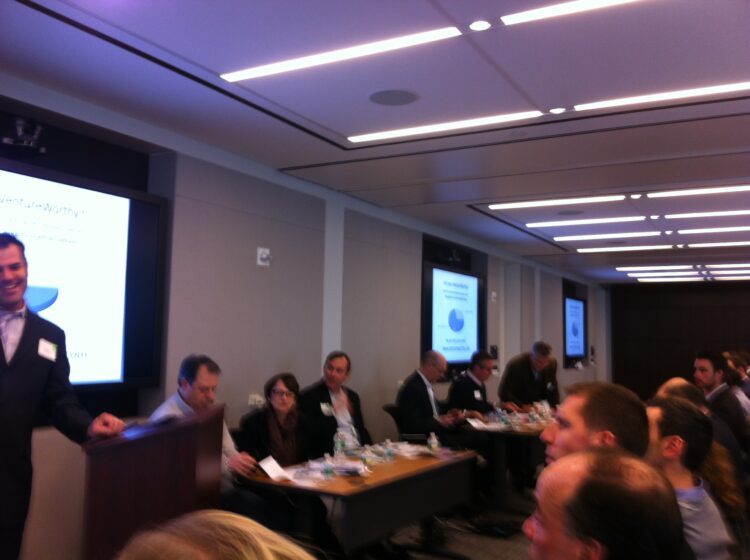The Funding Post recently hosted an Early Stage VC and Angel Funding event at Loeb & Loeb, moderated by Joe Daniels (Partner, Loeb & Loeb LLP) and with investors Marc Michel (Metamorphic Ventures), Jeanne Sullivan (StarVest Partners), Brian Smiga (Alpha Venture Partners), Alex Goldberg (Canary Ventures), Joshua B. Siegel (Georgetown Angels), Angela Lee (37 Angels) and Tim Haddock (FP Angels) in the hot seats.
Their suggestions for NY entrepreneurs…
Jeanne Sullivan: “Accelerators are pushing a lot of innovation. There are also over 50 shared spaces. The skies are blackened with VCs and angels coming in from Boston and the West Coast to invest here, too.”
Alex Goldberg: “The cost to starts companies decreased and we’re seeing a tremendous volume coming into New York Angels. Warren Buffett has what he calls the 3 I’s – innovation, imitation and idiocy. Focus on the first.“
Angela Lee: “You don’t have to fund raise. If you’re making money, that’s awesome. Don’t raise $3 million – make $3 million. Investors are a secondary path.”
Tim Haddock: “VC money is the most expensive form of capital you can come by. Take as little as possible, and only when necessary.”
On what investors look for in a startup:
Mark Michel: “A great team. Not one jockey – a team of people. You’re racing in a big race. The Kentucky Derby, not Yonkers. It’s easier to make money in a bigger market. What’s important? The quality of the service or product: You need all three: the jockey, the race, and the horse.”
Jeanne Sullivan: “We love CEOs who know what they’re doing and how to do it. You’ve got to have a person by your side who makes you look good and the team look great.”
Alex Goldberg: “I look for an unfair advantage. Someone who, if there’s a brick wall in front of them, I kind of feel sorry for the bricks.”
Joshua Siegel: “We want to know what’s the exit trajectory? If it’s three, five or seven years. The average is nine. Can the team execute and get there and can we help them? It’s a long relationship. And there’s nothing worse than dealing with a crazed entrepreneur.”
Angela Lee: “We what how the team interacts with each other. Are they cutting each other off? Are they listening to each other?
On the best way to find/approach an investor.
Angela Lee: “Introductions or referrals. 80% of our portfolio came through referrals.”
Brian Smiga: “I agree. Go to fewer investors and smaller audiences than just shooting blind bolts. Get a referral – and the best referral you can.”
Joshua Siegel: “Make your deck 15-18 pages max. Anything more than that no one will look at. In the first two or three pages, focus on your product.”
Alex Goldberg: “Read Guy Kawasaki’s The Art of the Start.”
Jeanne Sullivan: “And do not start your cover letter with ‘Dear Sir or Madam.’ Are you kidding me? You can’t look our names up on our website??? And find advisors. Find someone in who specializes in your domain. This is critical. I’m a real believer in accelerators and groups that make it happen.”
Marc Michel: “Using the racing analogy, there’s a fourth element: where are you on the racetrack? Starting out? Rounding the curve? That affects your valuation.”
The panel discussion ended with Smiga telling the story of Nahshon – the first person to venture in when Moses parted the Red Sea, comparing him to angel investors. “Nahshons are very important,” he advised. “They’re like your best friend. Angels take a tremendous leap of faith. There is no greater leap of faith, except marriage. It’s a lifelong relationship, not just the life of your company.”





